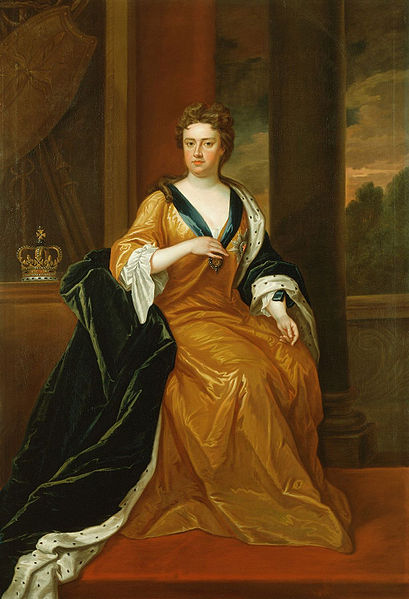

And just when you thought you had heard the last of the St John family at the court of Queen Anne – along comes Abigail Masham.
Abigail, the daughter of Francis Hill, a merchant trading in the Levant, was cousin to two of the most influential people at the court of Queen Anne – and by her marriage related to a third. Abigail’s mother was the former Elizabeth Jennings, aunt to Sarah, Duchess of Marlborough. Robert Harley, Tory Minister and First Lord of the Treasury, was her second cousin on her father’s side. And following her marriage to Samuel Masham she could count herself related to Henry St John, Viscount Bolingbroke, the grandson of her husband’s first cousin once removed Johanna, Lady St John. Let’s just say she was very well connected! And it was thanks to these connections that Abigail achieved her powerful position, as it could have turned out very differently.
Following her father’s death shortly after declaring himself bankrupt, the Hill family was definitely on its uppers. Ten year old Abigail entered the Chafford household of Sir George, 4th Baronet Rivers as a servant until her cousin Sarah came to the rescue, taking her into her own household and using her influence with the then Princess Anne. Sarah asked her royal friend to reserve a place for her cousin Abigail as one of her bedchamber women when a vacancy next came up – a move she would come to bitterly regret.
By 1700 Abigail was ‘Mother of the Maids’ in the Royal household. Upon Anne’s succession to the throne she became a woman of the bedchamber on a salary of £500 a year and this is when it all started to go wrong for Sarah.
Abigail soon made herself indispensable to the Queen and by 1705 was regarded as possibly the most influential of Anne’s servants. A shift in the relationship of the three women saw Whig supporting Sarah on the wrong political side while Abigail and her cousin Harley whispered sweet Tory nothings into the Queen’s ear.
Rumours abounded concerning Abigail’s unmarried status and her sexual preferences, but it seems her lack of fortune and plain features contributed more to the absence of suitors.
Then along came Samuel, the eighth son of Sir Francis Masham, Groom of the Bedchamber to Anne’s husband, Prince George. Samuel was several years younger than Abigail, but was not a reluctant bridegroom. The betrothal was brokered by Abigail’s cousin Harley who no doubt emphasized the advantages of marrying a Royal favourite. The marriage took place in 1707 and Abigail received 2000 guineas from the privy purse.
Abigail’s marriage and the Bishoprics Crisis of the same year acted as a catalyst in the bedchamber triumvirate. Although increasingly weary of Sarah’s constant interference it would be another four years before Anne eventually dismissed her.
Abigail turned her back on the cousin who had rescued her from penury. But Sarah never missed an opportunity to call attention to Abigail’s less than comely appearance, describing her as being ‘hideously ugly,’ but then she did have an axe to grind.
In fact, Abigail was fair game for everyone to take a pot shot at. Sir Arthur Maynwaring, journalist and politician, called her an ‘ugly hag’ with a ‘frightful face’ and ‘stinking breath.’ Harley supporter Sir William Legge, 1st Earl of Dartmouth described Abigail as ‘exceeding mean and vulgar in her manners, of a very unequal temper, childishly exceptious and passionate.’
Even her good friend Jonathan Swift had to admit she was ‘not very handsome.’ But he did add that she was ‘of a plain understanding, of great truth and sincerity …of an honest boldness and courage superior to her sex, firm and disinterested in her friendship and full of love, duty and veneration for the Queen her mistress.’
But with the ascendancy of Harley to the peerage, Abigail turned her allegiance to another kinsman, Henry St John, Viscount Bolingbroke. Probably not her wisest decision as he was also heading for a fall. Bolingbroke, Lady Johanna St John’s brilliant grandson, was found guilty of treason following his flirtation with the Jacobite Pretender and had an Act of Attainder passed against him.
However, any doubt about Abigail’s true affections for the Queen were dispelled when Anne died in 1714, leaving her favourite heartbroken. Even the toxic Sarah came to her cousin’s defence when Abigail was accused of making off with some of Anne’s jewels saying ‘I believed [Lady Masham] never rob’d any body but me.’
Her influence at court ended, Abigail retired to her home at Langley, near Windsor, although she remained on the royal guest list. Following the death of Sir Francis Masham, Abigail and Samuel moved to the Masham family home at Otes in Essex. Abigail died on December 6, 1734 after a long illness and was buried at All Saints Church, High Laver.